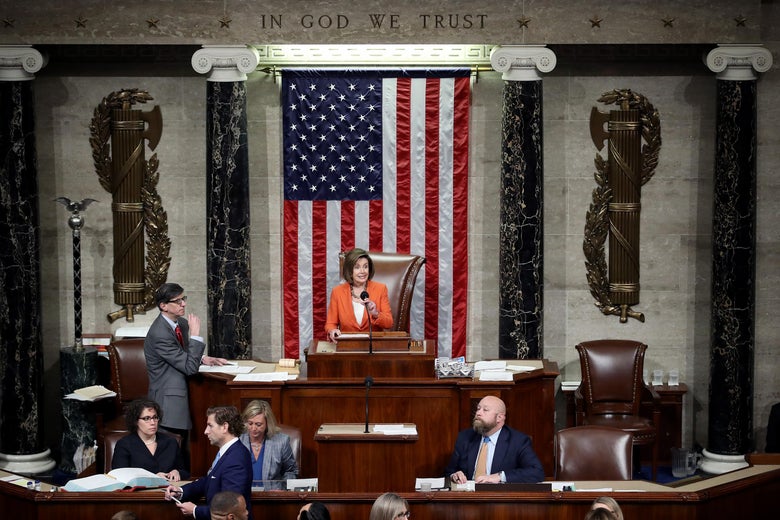
Speaker of the House Nancy Pelosi presides over a vote by the U.S. House of Representatives on a resolution formalizing the impeachment inquiry into President Donald Trump on October 31, 2019 in Washington, DC.
Win McNamee/Getty Images
The House voted on Thursday, by a margin of 232 to196, to pass an impeachment resolution—er, impeachment process resolution—that affirms the existing impeachment probe and lays out procedures for the next, public phases of the inquiry.
It was the first time since the inquiry began in late September that members have gone on-the-record to vote on it, and House Speaker Nancy Pelosi marked the occasion by presiding over the vote, as she rarely does. The results were… almost 100-percent partisan.
Almost.
While Democratic leaders were able to corral most of their holdouts who had not yet supported the impeachment inquiry, two Democrats still voted against the resolution. New Jersey Rep. Jeff Van Drew, a Democratic freshman representing a southern district in the state that Republicans had held for decades, ultimately voted no. (That he was flipping back-and-forth from “yes” to “no” on the procedural vote beforehand suggested he was somewhat torn.) The second Democrat to vote no was longtime Minnesota Rep. Collin Peterson, who holds the most Trump-friendly seat—it went for President Trump by 31 percentage points in 2016—of any Democrat in Congress.
Republicans, meanwhile, were able to keep their caucus unanimous in opposition, wrangling its few wobbly members like Florida Rep. Francis Rooney, who was undecided as of yesterday. Former Republican, and now independent, Michigan Rep. Justin Amash, voted in favor of the inquiry.
The ever-so-slight variance from a pure partisan outcome gave Republicans the talking point they wanted. It amounts to: We may have gotten our asses kicked by 36 votes, but we got our bipartisan asses kicked.
The resolution doesn’t change the process in the immediate term. The House, led by Intelligence Committee chairman Rep. Adam Schiff, will continue holding closed-door depositions in the coming weeks as they seek to collect all of the evidence from witnesses. The resolution governs the conduct of the inquiry as the investigation moves from depositions to public hearings in the Intelligence Committee and then, eventually, towards the drafting of specific impeachment articles in the Judiciary Committee.
The vote is not a great sign for Democrats’ chances of picking up Republican supporters in the eventual votes on impeachment articles. The pressure Republicans faced this week to get in line for a procedural vote will be nothing like the pressure they face to get in line on impeachment itself. But with the rules for the remainder of the process in place, and the hearing of testimony and the release of evidence coming to the public soon, it will be harder for Republicans to hide behind process complaints as the substantive case against the president is pressed in the open.
Readers like you make our work possible. Help us continue to provide the reporting, commentary and criticism you won’t find anywhere else.
Join Slate Plusfrom Slate Magazine https://ift.tt/2N0uAcu
via IFTTT
沒有留言:
張貼留言